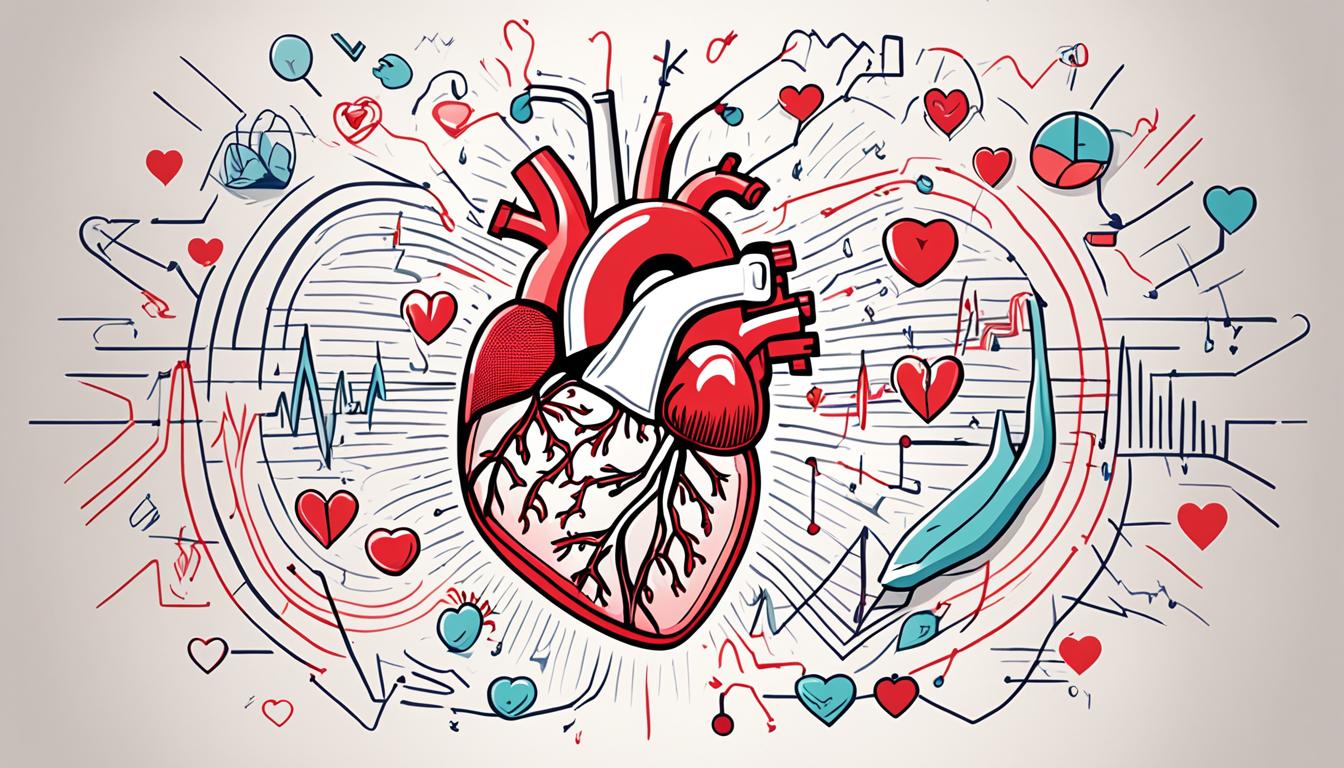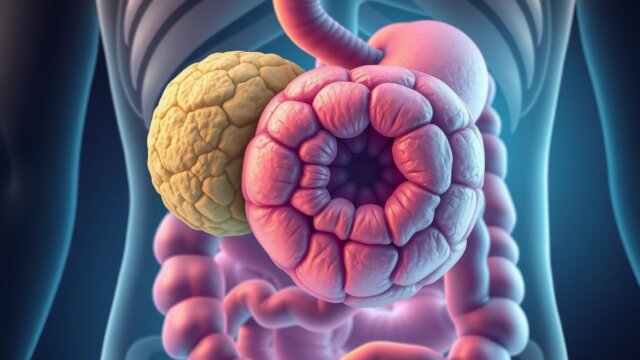FTC disclaimer: This post may contains affiliate links and we will be compensated if you click on a link and make a purchase.
Did you know that about 1.5% to 5% of people worldwide might have arrhythmia? This condition happens when the heart’s electrical signals don’t work right. It makes the heart beat too fast, too slow, or in a weird way. To manage arrhythmia well, it’s important to know about the types, causes, symptoms, and treatments of arrhythmia.
Key Takeaways
- Arrhythmia is a heart rhythm disorder that can cause the heart to beat too fast (tachycardia), too slow (bradycardia), or in an irregular pattern.
- Arrhythmias can range from harmless to life-threatening, depending on the type and underlying cause.
- Symptoms of arrhythmia can include chest pain, irregular pulse, weakness, dizziness, and fatigue.
- Diagnostic tests for arrhythmia include electrocardiogram (ECG), Holter monitor, and stress test.
- Treatment options for arrhythmia may include medications, electrical cardioversion, and catheter ablation.
What is Arrhythmia?
Definition and Overview of Arrhythmia
Arrhythmia is when your heart beats in an odd pattern, feeling like it’s racing or pounding. It happens when the electrical signals that control the heartbeat don’t work right. This can make your heart beat too fast, slow, or irregularly. Many things can cause arrhythmias, like heart problems, lifestyle, or health issues.
A normal heart beats in a regular pattern, thanks to electrical impulses. The heart has four valves that let blood flow one way only. In adults, a healthy heart beats between 60 and 100 times a minute. However, if the heart’s electrical signals get mixed up, you might get an abnormal rhythm, which can make your heart beat too fast or too slow.
Arrhythmias can happen for many reasons, like problems with the heart signals, changes in heart tissue, or certain medicines. They can also be caused by too much exercise or imbalances in your blood’s fluids, hormones, or electrolytes.
“Arrhythmia is an irregular heartbeat that can feel like a racing, fluttering, or pounding heart.”
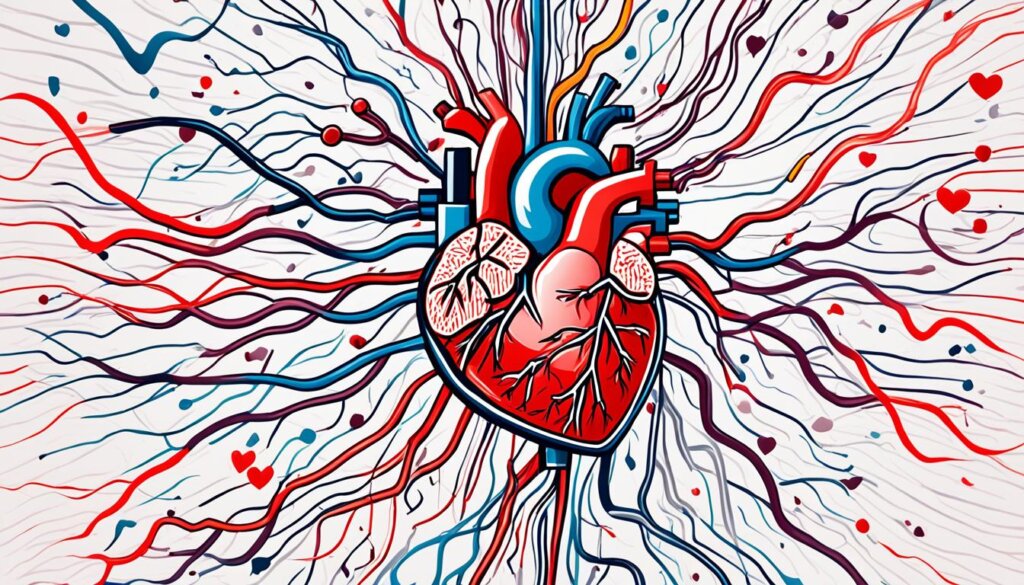
Atrial fibrillation is the most common type of arrhythmia, which causes the heart to beat fast and irregularly. A history of heart attacks, smoking, or congenital heart defects can affect your heart rhythm. Symptoms include a fast or slow heartbeat, lightheadedness, dizziness, shortness of breath, chest pain, sweating, and more.
Arrhythmia is a complex condition with many causes and symptoms. Knowing about it is key to understanding, diagnosing, and treating it.
Types of Arrhythmia
Arrhythmias are classified based on the speed of the heartbeat. Tachycardia is a rapid heartbeat, often exceeding 100 beats per minute, while bradycardia is a slow heartbeat, typically below 60 beats per minute. These heart rhythm disorders can vary in their severity and potential health implications.
Tachycardia: Rapid Heartbeat
Tachycardia encompasses several types of arrhythmia characterized by a fast heart rate. Atrial fibrillation (AFib) is a form of tachycardia with erratic heart signaling, leading to a rapid and uncoordinated heartbeat. Atrial flutter, another tachycardia type, features more organized heartbeats than AFib.
Supraventricular tachycardia includes irregular heartbeats starting above the ventricles, often resulting in sudden pounding heart episodes. Ventricular tachycardia is a rapid and irregular heart rate originating in the ventricles, potentially impacting proper blood pumping.
Bradycardia: Slow Heartbeat
Bradycardia is characterized by a slow heartbeat, typically below 60 beats per minute. This condition may be caused by aging, electrolyte abnormalities, medications, and abnormal thyroid function. Sick sinus syndrome is when the sinus node’s function alternates between being too slow and too fast, often found in older adults.
Other arrhythmia types include premature heartbeats, such as premature atrial or ventricular contractions, which can occur in patterns alternating with regular heartbeats.
Ventricular fibrillation is a serious condition in which chaotic signals cause the lower heart chambers to quiver, potentially resulting in death if not treated promptly.
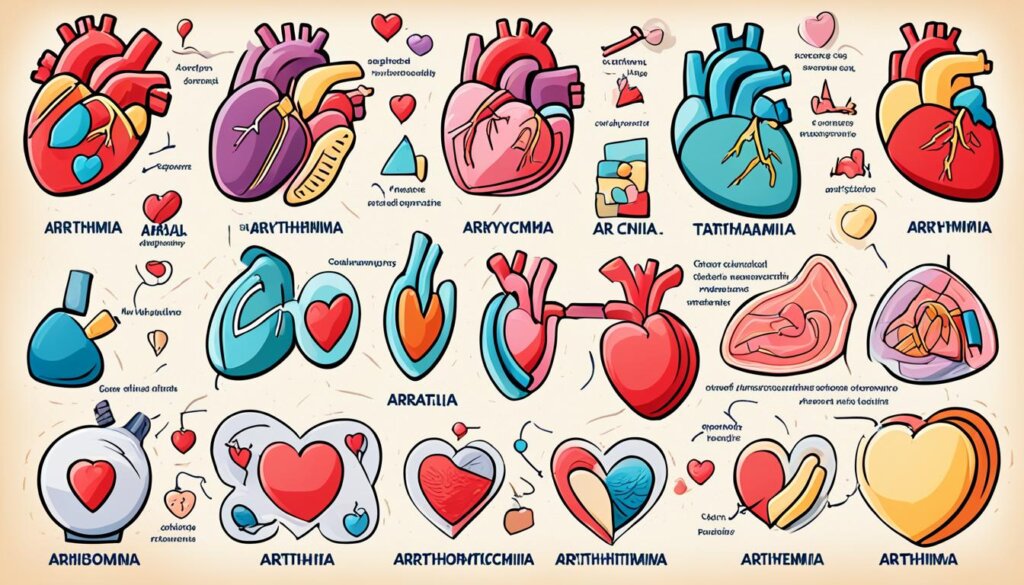
“Arrhythmias can have a wide range of causes, from underlying heart conditions to lifestyle factors and medical treatments. Understanding the different types is crucial for proper diagnosis and effective management.”
Causes of Arrhythmia
Arrhythmias, or irregular heartbeats, can originate from many sources, including heart conditions and lifestyle choices. Knowing what causes arrhythmia is key to managing and preventing it.
Heart Conditions and Diseases
Atrial fibrillation (AFib) is a common arrhythmia that can cause blood clots, stroke, and heart failure if not treated. Heart issues like congenital defects, heart valve disease, and coronary artery disease often lead to AFib. Other heart problems, like cardiomyopathy, sick sinus syndrome, and heart attacks, can also trigger arrhythmias.
Lifestyle Factors and Risk Factors
Some lifestyle choices and risk factors make people more likely to get arrhythmias. Getting older, drinking too much alcohol, smoking, being overweight, having sleep apnea, thyroid issues, and imbalances in electrolytes are some of these factors. Certain medicines and conditions, such as high blood pressure, diabetes, and kidney disease, also raise the risk.
Knowing what causes arrhythmia is important to finding the right treatment and prevention methods. By focusing on heart conditions and lifestyle, people can improve their heart health and lower their risk of arrhythmia.
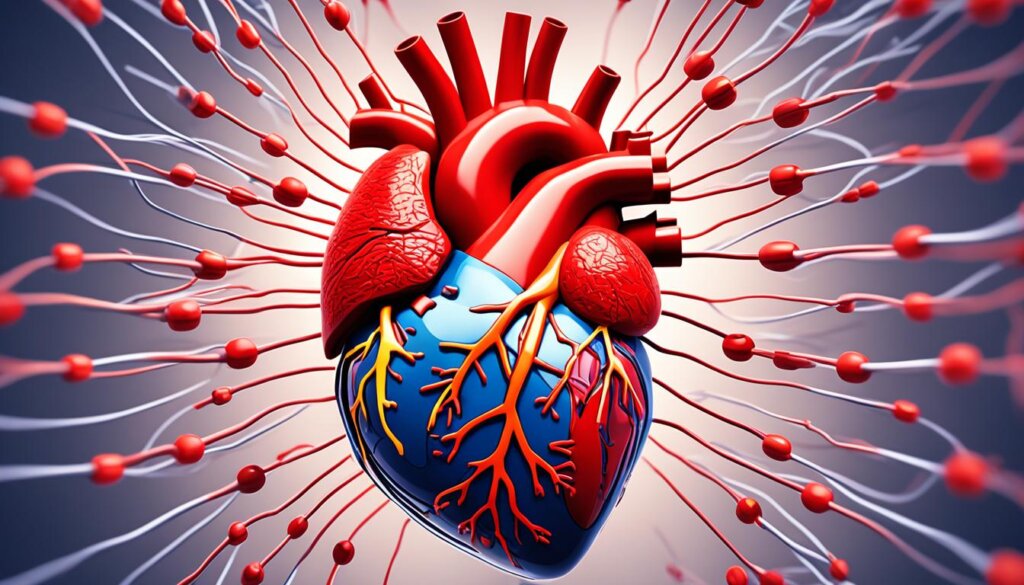
Arrhythmia Type | Characteristics | Potential Causes |
|---|---|---|
Atrial Fibrillation (AFib) | Irregular and often rapid heart rhythm | Heart diseases, congenital defects, high blood pressure, thyroid disorders, sleep apnea |
Ventricular Tachycardia (VT) | Rapid and inefficient contractions of the ventricles | Heart disease, electrolyte imbalances, certain medications |
Bradycardia | Slow heartbeat | Sinus node dysfunction, electrical circuit blockages |
Paroxysmal Supraventricular Tachycardia (PSVT) | Rapid and sudden heart rate increase | Congenital heart abnormalities |
Arrhythmogenic Right Ventricular Dysplasia (ARVD) | Inherited heart disease with abnormal heart muscle | Genetic factors, replacement of heart muscle with fat and scar tissue |
“Addressing the underlying causes of arrhythmia, whether they are related to heart conditions or lifestyle factors, is crucial for effective management and prevention of this heart condition.”
Understanding arrhythmia’s causes helps people take steps to keep their hearts healthy. Regular check-ups, lifestyle changes, and proper medical care are key to managing and preventing arrhythmias.
Symptoms of Arrhythmia
Arrhythmia, or an abnormal heart rhythm, can cause different symptoms. Some people might not feel anything out of the ordinary. But others might feel their heart racing, pounding, or fluttering, known as heart palpitations. It can also lead to chest pain, shortness of breath, dizziness, and tiredness. In serious cases, it can cause fainting or feeling like you’re going to pass out.
The symptoms of arrhythmia vary depending on the type and cause. For example, atrial fibrillation (AF), a common arrhythmia, can cause heart palpitations, shortness of breath, and fatigue. However, some arrhythmias might not show any symptoms at all, making them hard to spot and treat.
If you notice any arrhythmia symptoms, seeing a doctor is important. These symptoms could mean there’s a serious issue. Getting the right treatment early is key to managing arrhythmia and lowering the risk of stroke.
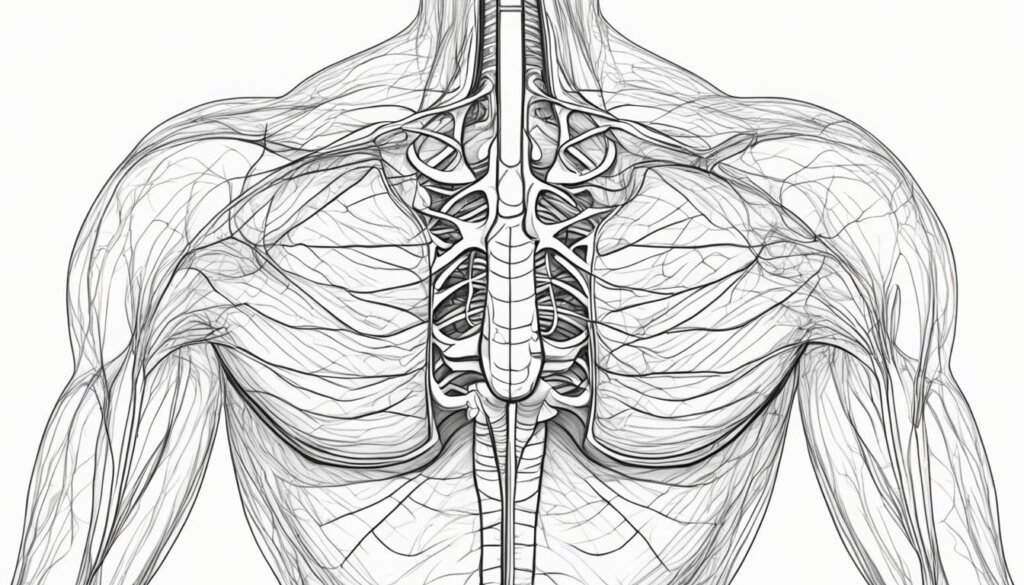
“Arrhythmias can affect all age groups, but AF is more common in older people.”
Diagnosing Arrhythmia
When they diagnose an arrhythmia, healthcare providers start by asking about your symptoms and performing a physical exam. They might then suggest tests and procedures to determine what kind of arrhythmia you have and why.
Tests and Diagnostic Procedures
An electrocardiogram (ECG or EKG) is often the first test for arrhythmia. It records your heart’s electrical activity. For longer monitoring, a Holter monitor tracks your heart’s electrical signals for 24 hours or more.
An event recorder can capture data over a month or two, recording your heart’s electrical system when symptoms occur.
Doctors might also suggest a stress test or a tilt-table test. These tests check how your heart acts while you exercise or change positions.
Sometimes, more detailed tests are needed. An electrophysiologic (EP) study uses electrodes in the heart to record electrical signals and diagnose rare arrhythmias. An esophageal electrophysiologic procedure can also be done to diagnose unpredictable arrhythmias.
Echocardiograms, especially transthoracic echocardiography (TTE), can show how your heart works and its structure when you have an arrhythmia.
By combining these tests and procedures, your healthcare provider can figure out your type of arrhythmia. They can then create a treatment plan.
Treatment Options for Arrhythmia
The treatment for arrhythmia, or irregular heartbeat, varies depending on the type, severity, and cause. Doctors may suggest medications, therapies, or surgeries to manage the condition and lower the risk of complications.
Medications and Therapies
Antiarrhythmic drugs help control the heart’s rate and rhythm. These include beta-blockers, calcium channel blockers, and drugs like amiodarone or sotalol. Blood thinners are also used to prevent blood clots and strokes in some arrhythmias. Changing habits to avoid triggers like alcohol, caffeine, stress, dehydration, and fatigue can also help manage arrhythmia.
Procedures and Surgeries
Doctors might suggest procedures or surgeries for serious or persistent arrhythmias. Cardioversion is a quick shock that resets the heart’s rhythm. Catheter ablation is a less invasive method that removes abnormal heart pathways, offering a lasting fix for irregular beats.
Pacemakers help with slow heartbeats that cause symptoms like dizziness, tiredness, and fainting. Implantable cardioverter-defibrillators (ICDs) are crucial for preventing dangerous fast heart rhythms. Sometimes, open-heart surgery is needed for arrhythmias that don’t respond to other treatments.
Choosing the right treatment for arrhythmia depends on the patient’s specific needs, the type and severity, and other health conditions. A detailed evaluation by a healthcare provider is key to finding the best treatment plan.
Treatment Option | Description |
|---|---|
Antiarrhythmic Drugs | Medications like beta-blockers, calcium channel blockers, and antiarrhythmic drugs like amiodarone or sotalol control the heart rate and rhythm. |
Anticoagulants | Blood-thinning medications are used to prevent blood clots and strokes associated with certain types of arrhythmia. |
Cardioversion | A quick electrical shock can reset the heart’s rhythm but may not prevent future episodes. |
Catheter Ablation | A minimally invasive procedure that can eliminate abnormal electrical pathways in the heart, providing a long-term solution for fast or irregular heartbeats. |
Pacemakers | Devices used to address slow heartbeats that cause symptoms like lightheadedness, fatigue, and fainting. |
Implantable Cardioverter-Defibrillators (ICDs) | Devices are used for patients at risk of life-threatening fast heart rhythms, such as ventricular tachycardia or ventricular fibrillation. |
Heart Surgery | Open-heart surgery may be necessary in some cases where other treatments are ineffective in resolving arrhythmias. |
“The choice of treatment for arrhythmia depends on the individual patient’s needs, the type and severity of the arrhythmia, and the underlying health conditions.”
Managing Arrhythmia
Managing arrhythmia, which means irregular heartbeats, is key to heart health. It requires a combination of treatments, lifestyle changes, and regular checks, which helps patients get the best results.
Following the doctor’s advice on medicines is important. Drugs like antiarrhythmic drugs and beta-blockers help control heart rhythms. They also lower the risk of stroke. It’s vital to monitor doctor visits to adjust treatments as needed.
Changing your lifestyle can also help manage arrhythmia. Eating right, staying active, and managing stress are good steps. These changes can make your heart work better and lessen arrhythmia episodes.
Keeping an eye on your heart activity is key. Tools like Holter monitors or implantable devices give insights into heart health. This helps doctors make better treatment plans.
Combining treatments, lifestyle changes, and monitoring helps manage arrhythmia well. Talking often with doctors and being active in your care is important. This approach can greatly improve your health outcomes.
Complications of Untreated Arrhythmia
If arrhythmia is not treated, it can lead to serious and life-threatening issues. People with atrial fibrillation (Afib) face a higher risk of stroke than others. Afib often results in severe strokes, which can be deadly. These strokes can block blood flow to different body parts, like the brain or lungs.
This can cause paralysis, blindness, and harm to the brain.
Afib can also lead to heart failure. The heart beats irregularly and fast, weakening it over time. People with Afib are more likely to have heart attacks. Not treating arrhythmia can also increase the risk of dementia due to less oxygen to the brain.
It’s important to get medical help and follow treatment advice for arrhythmia. Making healthy choices, like eating right, exercising, controlling blood pressure, and managing stress, can lower the risk of these problems.
Complication | Description | Risk Factors |
|---|---|---|
Stroke | Sudden disruption of blood flow to the brain leads to tissue damage and potential disabilities. | Atrial fibrillation, history of previous stroke or transient ischemic attack. |
Heart Failure | Weakening of the heart muscle, impairing its ability to pump blood effectively. | Atrial fibrillation, underlying heart conditions, and high blood pressure. |
Sudden Cardiac Arrest | Abrupt loss of heart function, leading to unconsciousness and potential death if not treated immediately. | Ventricular tachycardia or fibrillation, underlying heart disease. |
If you or someone you know is showing signs of arrhythmia, get medical help immediately. Quick diagnosis and treatment can stop these serious issues and improve health.
Prevention Strategies for Arrhythmia
A heart-healthy lifestyle can lower the risk, but we can’t prevent all arrhythmia cases. This means maintaining a healthy weight, exercising often, and managing conditions like high blood pressure or diabetes. Also, avoid too much alcohol, caffeine, or certain drugs.
Managing any conditions that might cause arrhythmia is key. This means taking your meds, checking your blood pressure and cholesterol, and quitting smoking. Eating right is also important.
Knowing and avoiding arrhythmia triggers is crucial. Stress, alcohol, caffeine, some exercises, and MSG in foods can trigger arrhythmia. Avoiding these can lower your risk of arrhythmia.
Exercise is very helpful in preventing arrhythmia. Activities like walking, swimming, or cycling strengthen the heart and boost heart health.
Watching your heart health and talking to your doctor about any issues is vital. Regular check-ups, monitoring your pulse, and noting any symptoms are important. Being proactive with your health can prevent arrhythmia and its complications.
“Preventing arrhythmia is not just about managing the condition itself, but also about addressing the underlying factors that contribute to it. By making lifestyle changes and working closely with your healthcare provider, you can take proactive steps to protect your heart health.”
Understanding Arrhythmia in Specific Populations
Arrhythmia, a condition in which the heartbeat is not normal, can affect people of all ages, including children, babies, and seniors. The reasons for arrhythmia and ways to treat it can change with age. Knowing these differences is key to getting the best care.
Arrhythmia in Children and Infants
Kids and babies often get arrhythmias because of heart defects or other health issues. These can show up as fast or slow heartbeats. Quick diagnosis and treatment are key to avoiding big problems. Places like the Women’s Heart Health Clinic at Stanford offer special care for these young ones, keeping both mom and baby safe during pregnancy.
Arrhythmia in Older Adults
As people get older, arrhythmias happen more often, especially sick sinus syndrome. Older folks might feel different symptoms and react differently to medicines, so care needs to be more specific. Devices like implantable loop recorders help treat arrhythmia in seniors with special methods for their age-related changes and to make sure they can still get breast cancer screenings.
Knowing how arrhythmia affects different ages helps doctors provide better care, which leads to better health outcomes and quality of life for patients. A detailed guide on arrhythmia offers more information on handling this condition in various groups.
Living with Arrhythmia
Living with arrhythmia can be tough, but with the right approach, many people lead fulfilling lives. At the Nora Eccles Harrison Cardiovascular Research and Training Institute, they study the heart’s electrical patterns. They aim to diagnose and treat cardiac arrhythmias. Thirty years ago, they found the cause of a common arrhythmia syndrome.
They’re now working on preventing dangerous arrhythmias and understanding their causes. This includes studying genetics and metabolism to help manage arrhythmias.
Knowing how to handle your symptoms is key when you have an arrhythmia. Some people with atrial fibrillation don’t feel any symptoms, so regular check-ups are vital. Following your treatment plan, which might include meds, lifestyle changes, or procedures, helps control your condition. Taking your meds as directed is crucial for managing your heart rhythm and preventing blood clots.
Support from doctors, support groups, and community resources can make a big difference. Feeling anxious or depressed is more common in people with atrial fibrillation. This can be due to the severity of the condition, how long you’ve had it, feeling uninformed, or having a poor relationship with your doctor. Connecting with others who go through similar things can offer great emotional and practical support.
Being proactive in managing your arrhythmia can help you live a full and active life. Always talk to a doctor before starting a new exercise program if you have AFib. Healthy habits like regular exercise, managing stress, and eating well can help you manage your symptoms and boost your health.
Healthy Lifestyle Habits for Managing Arrhythmia | Benefits |
|---|---|
Regular Exercise (150 minutes of moderate-intensity per week) | Reduces the impact of atrial fibrillation |
Stress Management | Helps control arrhythmia episodes triggered by long-term stress |
Balanced Diet | Maintaining a healthy weight is crucial, as being overweight increases the risk of developing AFib. |
Quitting Smoking | Smoking can worsen AFib conditions and increase the risk of heart diseases |
Limiting Alcohol Consumption | Excessive intake can trigger AFib episodes |
Adequate Sleep (7-9 hours per night) | About half of people with AFib don’t sleep well due to symptoms like sleep apnea. |
Monitoring Vitamin K Intake | Necessary for individuals taking warfarin to manage AFib |
By adopting these healthy habits and getting support, you can overcome the challenges of arrhythmia and keep a good quality of life. Atrial fibrillation affects over 1.5 million people in the UK. Research shows that a healthy lifestyle can greatly reduce its impact.
“Thirty years ago, our Investigators discovered the molecular basis of the most prominent genetically acquired arrhythmia syndrome.” – Nora Eccles Harrison Cardiovascular Research and Training Institute
Arrhythmia Research and Advancements
Research and advancements in arrhythmia are making big strides. They help us better understand this condition and find new treatment methods. The National Heart, Lung, and Blood Institute (NHLBI) leads much of this research. They work on new ways to diagnose and track arrhythmias. NHLBI also backs new tech like the RHYTHMIA HDx™ Mapping System through grants.
Scientists are investigating many factors to understand why arrhythmias occur. They study how lifestyle, medicines, genes, and stress affect them. NHLBI-funded studies also examine how being overweight affects heart health and genetic links to arrhythmia. Plus, they’re creating computer programs to check if medicines might cause arrhythmias.
New technology in medical imaging is key to managing arrhythmia, too. Researchers aim to make cardiac MRI images better for people with pacemakers. They’re also looking into MRI to see how scar tissue forms in the heart after treatment.
Clinical trials are testing new treatments for arrhythmias, including medicines and genetic therapies. NHLBI also looks into how well current treatments work for people with arrhythmia and other health issues, like kidney disease.
Research and new tech in arrhythmia care show the medical field’s dedication to helping people with this condition. About 5% of Americans get arrhythmias, causing over 250,000 deaths a year. Despite lots of funding, we still need new ways to manage this common and serious condition.
As researchers keep pushing forward, we look for a brighter future for arrhythmia care. This includes better diagnosis, tailored treatments, and a better life for those with this complex heart issue.
Conclusion
Arrhythmia is a complex heart rhythm disorder needing deep understanding and effective management. Atrial fibrillation (AFib) is the most common type of arrhythmia. It’s caused by many factors like age, heart changes, high blood pressure, metabolism, substance abuse, and genetics.
Knowing about arrhythmia’s types, causes, and symptoms can help you work with your doctor. You can create a plan to manage it and lower the risk of serious problems. Ongoing research will improve how we diagnose, treat, and support those with this heart issue.
Managing arrhythmia well means staying informed and proactive and working with your medical team. Understanding your condition and treatment options lets you maintain a healthy heart rhythm, which reduces the risk of complications and improves your quality of life.
FAQ
What is arrhythmia?
Arrhythmia is a condition where the heart’s rhythm is off. It happens when the electrical signals that control the heartbeat don’t work right. This can make the heart beat too fast, too slow, or in an odd pattern.
What are the different types of arrhythmia?
Arrhythmias are classified by the speed of the heartbeat. If it’s too fast, it’s called tachycardia, which is over 100 beats per minute. If it’s too slow, it’s called bradycardia, which is under 60 beats per minute.
There are different types, like atrial fibrillation, ventricular tachycardia, and ventricular fibrillation.
What causes arrhythmia?
Many things can cause arrhythmia. Heart conditions and diseases like coronary artery disease and cardiomyopathy can do it. Lifestyle choices and health conditions also play a role.
Things like smoking, drinking too much alcohol, and having diabetes or sleep apnea can increase the risk.
What are the symptoms of arrhythmia?
Symptoms include a fast or fluttering heartbeat, chest pain, and shortness of breath. You might also feel dizzy, tired, or like you’ll pass out.
The exact symptoms depend on the type of arrhythmia and its cause.
How is arrhythmia diagnosed?
Doctors start by asking about symptoms and doing a physical exam. Then, they might use tests like an electrocardiogram (ECG) or a Holter monitor.
They might also do a stress test or cardiac catheterization to determine what kind of arrhythmia it is and why.
What are the treatment options for arrhythmia?
Treatment varies by the type and severity of the arrhythmia. Doctors might prescribe drugs like antiarrhythmics or blood thinners. In some cases, they might suggest cardioversion, catheter ablation, or putting in a pacemaker or ICD.
How can I manage arrhythmia?
Managing arrhythmia means getting the right treatment and making lifestyle changes. For example, you might need to change your diet, exercise more, or handle stress better.
It’s important to keep up with doctor’s appointments to ensure that the treatment is working and to adjust it if needed.
What are the potential complications of untreated arrhythmia?
If not treated, some arrhythmias can lead to serious problems like stroke, heart failure, or sudden cardiac arrest. These can be very dangerous, so it’s key to get medical help and follow treatment plans.
Can arrhythmia be prevented?
You can’t always prevent arrhythmia, but a healthy lifestyle can lower the risk. This means staying at a healthy weight, exercising regularly, and managing health conditions like high blood pressure or diabetes.
Avoiding too much alcohol, caffeine, or certain medicines can also help.
How does arrhythmia affect specific populations?
Arrhythmia can happen to anyone, including kids, babies, and older adults. It might be due to heart defects or other conditions in kids and babies. In older adults, it’s more common and can be linked to conditions like sick sinus syndrome.
